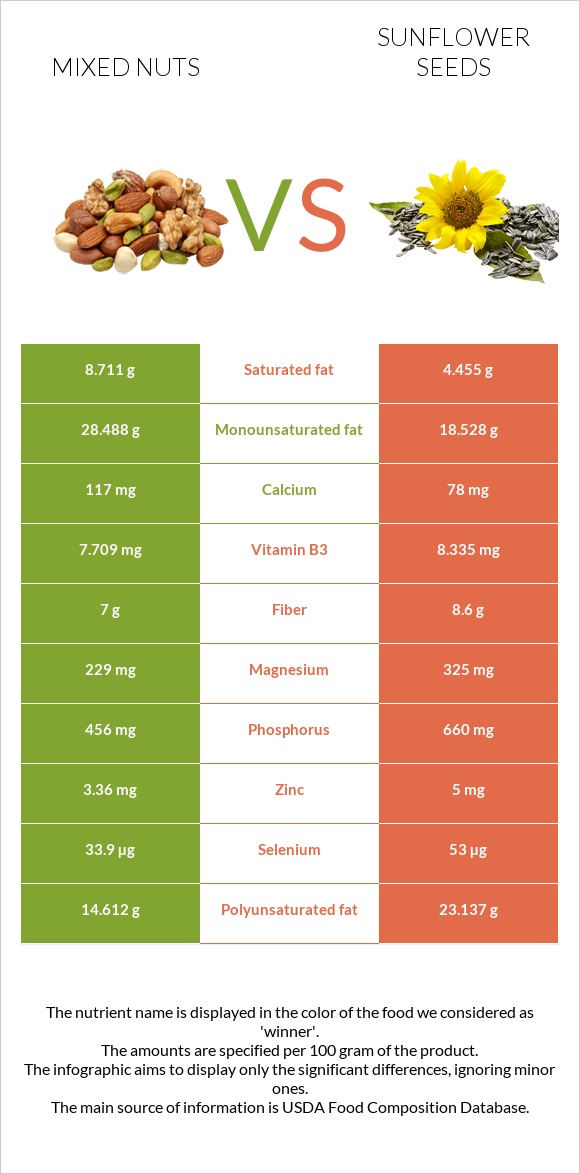Mixed nuts vs. Sunflower seeds — In-Depth Nutrition Comparison
Compare
Summary of differences between mixed nuts and sunflower seeds
- Mixed nuts have less vitamin E, vitamin B1, copper, vitamin B6, folate, selenium, iron, phosphorus, and magnesium than sunflower seeds.
- Sunflower seeds cover your daily need for vitamin E, 182% more than mixed nuts.
- Mixed nuts have 2 times more saturated fat than sunflower seeds. While mixed nuts have 8.711g of saturated fat, sunflower seeds have only 4.455g.
These are the specific foods used in this comparison Nuts, mixed nuts, oil roasted, with peanuts, without salt added and Seeds, sunflower seed kernels, dried.
Infographic

Infographic link
Mineral Comparison
Mineral comparison score is based on the number of minerals by which one or the other food is richer. The "coverage" charts below show how much of the daily needs can be covered by 300 grams of the food.
| Contains more CalciumCalcium | +50% |
| Contains less SodiumSodium | -44.4% |
| Contains more MagnesiumMagnesium | +41.9% |
| Contains more IronIron | +101.1% |
| Contains more CopperCopper | +98.5% |
| Contains more ZincZinc | +48.8% |
| Contains more PhosphorusPhosphorus | +44.7% |
| Contains more SeleniumSelenium | +56.3% |
Vitamin Comparison
Vitamin comparison score is based on the number of vitamins by which one or the other food is richer. The "coverage" charts below show how much of the daily needs can be covered by 300 grams of the food.
| Contains more Vitamin KVitamin K | +∞% |
| Contains more Vitamin CVitamin C | +180% |
| Contains more Vitamin AVitamin A | +∞% |
| Contains more Vitamin EVitamin E | +349.7% |
| Contains more Vitamin B1Vitamin B1 | +683.1% |
| Contains more Vitamin B2Vitamin B2 | +81.1% |
| Contains more Vitamin B6Vitamin B6 | +282.1% |
| Contains more FolateFolate | +173.5% |
All nutrients comparison - raw data values
| Nutrient |  |
 |
DV% diff. |
| Vitamin E | 7.82mg | 35.17mg | 182% |
| Vitamin B1 | 0.189mg | 1.48mg | 108% |
| Copper | 0.907mg | 1.8mg | 99% |
| Vitamin B6 | 0.352mg | 1.345mg | 76% |
| Polyunsaturated fat | 14.612g | 23.137g | 57% |
| Folate | 83µg | 227µg | 36% |
| Selenium | 33.9µg | 53µg | 35% |
| Iron | 2.61mg | 5.25mg | 33% |
| Phosphorus | 456mg | 660mg | 29% |
| Monounsaturated fat | 28.488g | 18.528g | 25% |
| Magnesium | 229mg | 325mg | 23% |
| Saturated fat | 8.711g | 4.455g | 19% |
| Zinc | 3.36mg | 5mg | 15% |
| Vitamin B2 | 0.196mg | 0.355mg | 12% |
| Fiber | 7g | 8.6g | 6% |
| Vitamin K | 5.7µg | 0µg | 5% |
| Fats | 53.95g | 51.46g | 4% |
| Calcium | 117mg | 78mg | 4% |
| Manganese | 2.04mg | 1.95mg | 4% |
| Vitamin B3 | 7.709mg | 8.335mg | 4% |
| Starch | 4.2g | 2% | |
| Calories | 607kcal | 584kcal | 1% |
| Protein | 20.04g | 20.78g | 1% |
| Vitamin C | 0.5mg | 1.4mg | 1% |
| Choline | 52mg | 55.1mg | 1% |
| Net carbs | 14.05g | 11.4g | N/A |
| Carbs | 21.05g | 20g | 0% |
| Potassium | 632mg | 645mg | 0% |
| Sugar | 4.15g | 2.62g | N/A |
| Sodium | 5mg | 9mg | 0% |
| Vitamin A | 0µg | 3µg | 0% |
| Vitamin B5 | 1.14mg | 1.13mg | 0% |
| Trans fat | 0.055g | N/A | |
| Tryptophan | 0.22mg | 0.348mg | 0% |
| Threonine | 0.703mg | 0.928mg | 0% |
| Isoleucine | 0.826mg | 1.139mg | 0% |
| Leucine | 1.656mg | 1.659mg | 0% |
| Lysine | 0.782mg | 0.937mg | 0% |
| Methionine | 0.283mg | 0.494mg | 0% |
| Phenylalanine | 1.182mg | 1.169mg | 0% |
| Valine | 1.001mg | 1.315mg | 0% |
| Histidine | 0.572mg | 0.632mg | 0% |
| Omega-3 - EPA | 0.005g | 0.014g | N/A |
| Omega-3 - ALA | 0.082g | N/A | |
| Omega-6 - Eicosadienoic acid | 0.013g | 0g | N/A |
| Omega-6 - Linoleic acid | 14.455g | N/A |
Macronutrient Comparison
Macronutrient breakdown side-by-side comparison
Protein:
20.04 g
Fats:
53.95 g
Carbs:
21.05 g
Water:
2.08 g
Other:
2.88 g
Protein:
20.78 g
Fats:
51.46 g
Carbs:
20 g
Water:
4.73 g
Other:
3.03 g
| Contains more WaterWater | +127.4% |
~equal in
Protein
~20.78g
~equal in
Fats
~51.46g
~equal in
Carbs
~20g
~equal in
Other
~3.03g
Fat Type Comparison
Fat type breakdown side-by-side comparison
Saturated fat:
Sat. Fat
8.711 g
Monounsaturated fat:
Mono. Fat
28.488 g
Polyunsaturated fat:
Poly. Fat
14.612 g
Saturated fat:
Sat. Fat
4.455 g
Monounsaturated fat:
Mono. Fat
18.528 g
Polyunsaturated fat:
Poly. Fat
23.137 g
| Contains more Mono. FatMonounsaturated fat | +53.8% |
| Contains less Sat. FatSaturated fat | -48.9% |
| Contains more Poly. FatPolyunsaturated fat | +58.3% |
Carbohydrate type comparison
Carbohydrate type breakdown side-by-side comparison
Starch:
4.2 g
Sucrose:
4.15 g
Glucose:
0 g
Fructose:
0 g
Lactose:
0 g
Maltose:
0 g
Galactose:
0 g
Starch:
0 g
Sucrose:
2.5 g
Glucose:
0 g
Fructose:
0 g
Lactose:
0 g
Maltose:
0 g
Galactose:
0 g
| Contains more StarchStarch | +∞% |
| Contains more SucroseSucrose | +66% |
~equal in
Glucose
~0g
~equal in
Fructose
~0g
~equal in
Lactose
~0g
~equal in
Maltose
~0g
~equal in
Galactose
~0g





